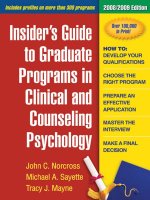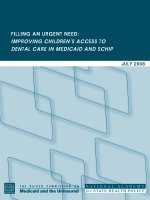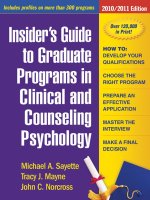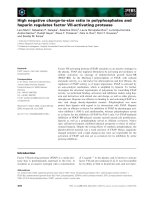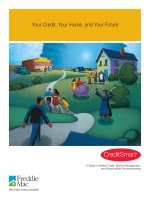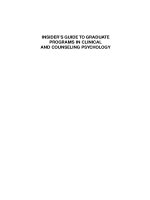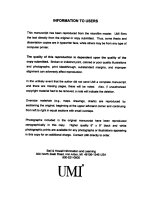Students must write aguide to better writing in coureswork and examinations
Bạn đang xem bản rút gọn của tài liệu. Xem và tải ngay bản đầy đủ của tài liệu tại đây (1.9 MB, 441 trang )
Students Must Write
If you are to do well as a student, and progress in your chosen career, the
ability to express yourself clearly, concisely and persuasively in writing is a
skill you should be trying to develop.
Students Must Write is a guide to better writing for students of all
subjects.
It may be read either as an alternative to a course on written communication
or to complement such a course. Tutors who have recommended earlier edi-
tions to their students will find that this new edition continues to provide a
straightforward introduction to the essentials of scholarly writing. Changes
have not been made simply for the sake of change, but all chapters have
been updated where necessary – especially in relation to the increasing
importance of computers in retrieving information and in preparing
course-
work assignments.
You will find straightforward advice on the choice and use of words; on
how to write for easy reading; on how to use numbers, tables and illustra-
tions to complement your words; on how to cite sources of information and
list bibliographic details of these sources; on how to answer questions in
coursework, tests and examinations; on how to write a dissertation, long
essay, term paper, project report or thesis; on how to write letters and
appli-
cations; on using a computer as an aid to writing; and on punctuation and
spelling.
The exercises headed Improve your writing, at the end of most chapters,
can be undertaken by students working alone or used by tutors as a basis for
group work in courses on written communication.
Robert Barrass has many years’ experience of helping students on degree
and diploma courses at the University of Sunderland to improve their
writing and other key skills. His other books on key skills, published by
Routledge, include Study! A Guide to Effective Learning, Revision and Exam-
ination Techniques.
Students Must Write
A guide to better writing in
coursework and examinations
Third edition
Robert Barrass
First published 1982 by Methuen & Co. Ltd
Second edition published 1995 by Routledge
Third edition published 2005 by Routledge
2 Park Square, Milton Park, Abingdon, Oxon OX14 4RN
Simultaneously published in the USA and Canada by Routledge
270 Madison Ave, New York, NY 10016
Routledge is an imprint of the Taylor & Francis Group
This edition published in the Taylor & Francis e-Library, 2005.
“To purchase your own copy of this or any of Taylor & Francis or Routledge’s
collection of thousands of eBooks please go to www.eBookstore.tandf.co.uk.”
© 2005 Robert Barrass
All rights reserved. No part of this book may be reprinted or
reproduced or utilised in any form or by any electronic,
mechanical, or other means, now known or hereafter
invented, including photocopying and recording, or in any
information storage or retrieval system, without permission in
writing from the publishers.
British Library Cataloguing in Publication Data
A catalogue record for this book is available from the British Library
Library of Congress Cataloging in Publication Data
A catalog record for this book has been requested
ISBN 0-203-00437-X Master e-book ISBN
ISBN 0–415–35826–4 (hbk)
ISBN 0–415–35825–6 (pbk)
x
Contents
List of figures and tables
Preface xiii
Acknowledgements xiv
1 Judged by your writing 1
Effective writing as the basis for success 1
Could you improve your writing? 6
Some key skills 7
2 Four reasons for writing 11
Writing helps you to remember 11
Making good notes 11
Writing helps you to observe 15
Making notes in practical work 16
Writing helps you to think 17
Capturing your thoughts 17
Writing helps you to communicate 18
Improve your writing 19
Listen and note 19
Observe and describe 19
Think and write 19
Read good prose 20
3 How students should write 21
Use words to convey your thoughts 21
Essential characteristics of scholarly writing 21
Present the results of your own thinking 23
Originality 23
Improve your writing 25
Prepare a set of instructions 26
Read critically 26
Practise writing 29
vi Contents
4 Answering questions in coursework 31
Think about the question 31
Analyse the question 32
Stimulate your thoughts 32
Plan your answer 34
Select effective headings 34
Prepare a plan of your answer: a topic outline 34
Maintain order 36
Write your answer 39
Write in your own words 39
Write at one sitting 40
Check your answer 41
Assess your answer 44
Improve your writing 45
Always work to a topic outline as you write 46
Learn from successful writers 46
Discuss your written work with other students 47
Benefit from your assessor’s criticisms 49
Prepare every composition in four stages 50
5 Thoughts into words 51
Vocabulary 51
The meaning of words 54
Some words that many people confuse 54
Some words that many people misuse 58
The words of your subject 63
Abbreviations, contractions and acronyms 65
Improve your writing 66
Choose words with care 66
Use your dictionary 66
Understand the words used in questions 67
Prepare definitions 68
6 Using words 69
Words in context 69
Position your words with care 69
Repeat a word if necessary 70
Use standard English 71
Avoid ready-made phrases 71
Superfluous words 72
Reasons for verbosity 75
Improve your writing 79
Be clear and concise 79
Read to understand 79
Read to summarise 80
Edit the work of others 82
Contents
vii
7 Using numbers, tables and illustrations 85
Use numbers when you can be precise 85
Using numbers in written work 85
Using International System units 86
Use tables and illustrations to help you explain 88
Tables 88
Illustrations 90
8 Helping your readers 101
Write for easy reading 102
How to begin 102
Control 102
Emphasis 102
Rhythm 105
Style 106
How to end 106
Capture and hold your reader’s interest 107
Improve your writing 107
Write for your readers 107
Make your writing interesting 108
Write good English 108
Read good English 109
9 Finding and using information 114
Think before you read 114
What to read 115
Make good use of local libraries 115
Use resources available via the internet 123
Use other resources available in libraries 126
How to read 125
Evaluate each source of information 125
Read to find just the information you need at the time 126
Make good notes as you read 127
135
182
viii Contents
Improve your writing 131
Use your notes 131
Cite sources of information 132
List your sources of information 134
10 questions in tests and examinations
Taking tests as part of coursework 135
Answering questions in tests 136
Taking examinations 137
Learn from other students’ mistakes 138
Answering questions in a theory examination 147
Answering questions in a practical examination 150
11 a dissertation, long essay, term paper, project report
or thesis 152
Agree your terms of reference with your supervisor 153
Find out how your work will be assessed 153
Organise your work 155
Write from the start 157
Search the literature 160
Review the literature 163
Improve your writing 165
Work on your first draft 165
Check your composition 166
12 letters and applications 168
Writing a good letter 168
Communicating by electronic mail 176
Improve your writing 178
Applying for employment 178
13 computer as an aid to writing
Using your computer 182
Improving your keyboard skills 182
Word processing 182
Making more use of your computer 187
Desk top publishing 187
Preparing presentations 187
Using spreadsheets 188
Preparing and using a database 188
193
Looking after your documents 189
Looking after yourself when using a computer 190
Purchasing a computer 191
14 is the point? A quick guide to punctuation
Using punctuation marks to make your meaning clear 194
Contents
ix
Using punctuation marks to ensure the smooth flow of language 194
Using conjunctions to contribute to the smooth flow of language 195
Using capital letters 195
Punctuation marks that end a sentence 196
Full stop, question mark and exclamation mark 196
Punctuation marks used within a sentence 197
Comma 197
Brackets and dashes 199
Colon and semicolon 199
Other essential marks 199
Apostrophe 199
Hyphen 200
Quotation marks 201
Improve your writing 202
15 check 203
Some reasons for poor spelling 203
Some rules to remember 204
Improve your writing 207
Read good prose 207
Spelling test 207
Take an interest in etymology: the study of the origins of
words 208
Keep a good dictionary on your bookshelf 208
References
209
Dictionaries 209
Further reading 209
Index
212
9.1
12.1
175
Figures and tables
Figures
1.1 A guide to prioritising tasks 10
2.1
Make good notes
15
3.1
Keep all communications short and to the point
23
4.1
What written communication involves
42
5.1
Use words you expect your readers to understand
64
6.1 In your writing cut out all unnecessary words 73
7.1 Drawing as an aid to observation and description 92
7.2 Graph or line chart 93
7.3 How interpolation and extrapolation can be misleading 94
7.4 Histogram 95
7.5 Column graph or vertical bar chart; and pictogram 96
7.6 How a chart with a suppressed zero can be misleading 97
7.7 Horizontal bar chart 98
7.8 Pictorial bar chart 98
7.9 Circular graph or pie chart 99
7.10 A line drawing as a summary of observations 100
8.1 To write well most people need to be left alone 111
Relate the time spent in searching for information to
the time available for your work 127
9.2 The central place of your notes in active study 131
10.1 Use your time effectively in examinations 147
11.1 Do not attempt too much 154
11.2 Preparing a dissertation: allocating your time 158
In business a letter or e-mail is usually a more satisfactory
means of communication than a telephone conversation
1.2
4.1
38
5.1
6.3
6.4
9.3
9.5
129
10.2
141
10.3
Tables
Figures and tables
xi
1.1
Judged by your writing 2
Some skills needed in studying any subject and in any profession 8
2.1
Making good notes as an aid to thinking and learning 13
3.1
Some characteristics of scholarly writing 25
Introductory and connecting phrases that can usually be omitted
without altering the meaning of the sentence
4.2
Introductory phrases that should usually be deleted 39
4.3
Ensure your work is well presented
44
4.4
Scoring marks for a written answer as part of a degree course
45
4.5
How to prepare a handwritten composition in coursework
50
Prefer a short word to a long word if the short word is more
appropriate 53
5.2
The word often misused 59
5.3
The incorrect qualification of words 61
5.4
Tautology: saying the same thing twice using different words
62
6.1
Examples of the word only out of place 70
6.2
Avoid idiomatic expressions 72
Circumlocution: the use of many words where fewer would be
better 74
Some phrases that should not be used if one word would serve
your purpose better 75
6.5
Examples of the use of the active and passive voice 78
7.1
Some International System units of measurement (SI units)
87
7.2
The world: people and land use 89
9.1
Some sources of information 115
9.2
Three systems used for classifying books in libraries 119
Some electronic sources of information on articles published in
journals 122
9.4
How to record complete bibliographic details of a book 128
How to record complete bibliographic details of an article in a
serial publication (a journal, magazine or newspaper)
10.1
Allocating your time to examination questions 141
Three ways of allocating your time in a three-hour written
examination, and the possible consequences
Allocating the 30 minutes available for a written answer,
when you have to answer six questions of similar length in a
three-hour examination 143
11.1
The parts of a dissertation or project report 156
12.1
Different kinds of letter and their tone 169
12.2
Layout of a formal business letter 170
xii Figures and tables
12.3
Example of a formal business letter 171
12.4
Layout of a less formal business letter 172
12.5
How to use a postcard 173
12.6
Forms of address (to be used on envelopes) 176
12.7
Example of a letter of application 179
12.8
Example of a curriculum vitae or résumé 180
14.1
Parts of speech: classifying words 195
Preface
The ability to express yourself is an essential basis for success as a student,
when applying for employment and in any career. In all academic subjects
students must write, and all teachers and lecturers should encourage their
students to write well. This book, therefore, is for all students: both (a) for
those who know that their written work does not give a true indication of
their ability, who accept that if they could improve their writing they could
score higher marks in all coursework and examinations, and (b) for those
who although satisfied that they write well are prepared to consider the
possibility of improvement. By improving their writing all students should
be able to improve the quality of their thinking – because writing and
thinking are very closely associated – and by submitting better written
work for assessment they should achieve higher grades.
In this third edition account is taken of the increasing use of computers
over the past ten years, for information retrieval and in preparing written
assignments as part of coursework. The order of presentation reflects the
changing needs of students from the first to the final year of a degree
or diploma course. I hope it will help all students, whether they are con-
tinuing their education soon after leaving school, studying part-time while
in employment, or returning to college or university after a period in full-
time employment. Changes have been made in all chapters, and some have
been completely revised, but my purpose has not changed: this is to
provide a guide to better writing that students can read, perhaps one
chapter each week when they start a college or university course, and then
keep to hand for reference whenever they need help with their writing.
Most chapters end with a section headed Improve your writing which
includes exercises that may be undertaken by students working alone or
used by tutors as ideas for use in their courses on written communication.
Robert Barrass
Acknowledgements
This book is based on my experience as a principal lecturer at the Univer-
sity of Sunderland. I write not as a grammarian but as a teacher, tutor and
administrator. My intention is to help students of all subjects to think
clearly and to express their thoughts effectively in writing.
For their help in preparing this third edition, I thank Jonathan Barrass
who advised on the use of computers as an aid to planning and writing;
Jane Moore of the University of Sunderland’s Murray Library who read the
typescript for the chapter on finding and using information; both Margaret
Parsons of the School of Education and Lifelong Learning and Robert
Jewitt of the School of Languages, Communications and Culture who read
the whole typescript; and both Trevor Hartley and Norman Catcherside of
the School of Health, Natural and Social Sciences who gave IT support
and advice. I also thank Adrian Burrows who drew the cartoons; and Ann,
my wife, for her interest, encouragement and help in preparing successive
editions.
The comments on the writing of 18-year-old students in the UK,
included in chapters 1 and 10, are based on examiners’ reports. But the
examples of poor English included in chapters 3 and 6, with suggested
improvements, are all from books – some from books on writing – not from
the written work of students. Like Gowers (1986), I do not give the source
of
such extracts.
1
1
2
3
Judged by your writing
If your long-term objective in study is to achieve your full potential, and
obtain the highest grades of which you are capable, consider three
reasons
why many students underachieve.
Some lack motivation, and do not work hard enough.
Many attend classes and work hard, but have poor time management
skills and do not study effectively.
More do study effectively and know their work, yet underachieve
because they pay insufficient attention to improving their ability to
communicate their thoughts in writing.
Effective writing as the basis for success
Writing is important in studying all subjects, and in all professions. Only by
writing well can you give a good account of yourself as a student or when
applying for employment, or in a career when writing e-mails,
memoranda,
letters, instructions and reports. It is by your writing that many people
judge you (see Table 1.1).
If you are to achieve your full potential as a student, and progress in your
chosen career, the ability to express yourself clearly, concisely and persua-
sively in writing is an essential skill that you should be trying to develop.
As a student you write with a pen for several hours each day, making
notes in lectures, practical classes, seminars, tutorials and private study.
And you write using a word processor when completing important course-
work assignments, project reports and theses. You score marks for all your
written work, both indirectly if you make good notes when studying and
directly if you communicate your thoughts effectively in assessed course-
work, tests and examinations.
2
Students Must Write
Table 1.1 Judged by your writing
Characteristics of your writing Impression created
(a) Desirable Favourable
Clearly expressed Clear thinking
Spelling correct Well educated
Punctuation and grammar good Competent
Well presented Well organised
Helpful Considerate
(b) Undesirable Unfavourable
Badly expressed Inconsiderate
Spelling poor Lazy
Punctuation and grammar poor Careless
Badly presented Incompetent
Handwriting illegible Inconsiderate
It is mainly by the quality of your writing that assessors find out what
you know and how much you understand, and judge the quality of your
thinking. In any assessed written work, if two students were otherwise
equal in ability and intelligence you would expect the one who was the
better able to convey thoughts effectively in writing to score the higher
marks. So it is important to recognise, from the start of your course, that
your final grades will depend not only on your knowledge and under-
standing of your subject but also on how well you are able to convey this
knowledge and understanding in writing.
All learning depends on the understanding and effective use of language;
and the purpose of all education should be to help students develop the
ability to think critically, and to express their thoughts effectively whether
speaking or writing. They should also be encouraged to read critically –
thinking about what they read – because reading, supported by observation
and conversation, is the key to knowledge. There is nothing new in these
assertions.
For example, the report of a government committee of inquiry into the
teaching of English in England (Newbolt, 1921) emphasised: (a) that all
children must be taught to speak well before they can learn to write well;
(b) that English, as the instrument of thought for English-speaking people,
provides the basis for teaching all subjects; (c) that every teacher, teaching
in English, is a teacher of English [because we learn by example, as well as
by specific instruction]; (d) that education should be ‘guidance in the
acquiring of experience’; and (e) that the appreciation of English literature
3
Judged by your writing
is important not only for the pleasure to be derived from reading but also
as
‘the lasting communication of experience’ and as a good influence on the
reader’s own use of the language.
These thoughts were summarised by George Sampson, a member of the
Newbolt committee, and 25 years later by Dorothy L. Sayers and by Eric
Partridge.
English . . . includes and transcends all subjects. It is for English people
the whole means of expression, the attainment of which makes them
articulate and intelligible human beings, able to inherit the past, to
possess the present and to confront the future. It is English in this
sense that we must teach our children all day long, at all stages of
their
school life.
. . . every teacher is a teacher of English because every teacher is a
teacher in English.
English for the English, George Sampson (1925)
Modern education concentrates on teaching subjects, leaving the
method of thinking, arguing and expressing one’s conclusions to be
picked up by the [scholars as they go along . . . Teachers] are doing for
their pupils the work which the pupils themselves ought to do. For the
sole true end of education is simply this: to teach [people] how to learn
for themselves; and whatever instruction fails to do this is effort spent
in vain.
The Lost Tools of Learning, Dorothy L. Sayers (1948)
If only teachers [of all subjects] would teach their pupils to think out
every problem, and insist that all questions be answered thoughtfully
and clearly, this salutary and indeed indispensable discipline and exer-
cise of the mind would immensely improve the pupil’s speech and
writing, not merely in the English class but also in every other, both at
school and outside.
English: A Course for Human Beings, Eric Partridge (1949)
A further 25 years later the need to teach English Language across the cur-
riculum was also the main point made in the report of another government
inquiry into the teaching of English (Bullock, 1975); and its relevance to
the study of all academic subjects was further emphasised in the 1980s in
examiners’ reports on the written work of 18-year-old students.
4
Students Must Write
English language and literature
Some students wrote with charm and intelligence, displaying a love of
books and of scholarship. Their work, written in clear, direct and
simple
English, was a delight to read. Others with limited practice in essay,
précis, summary and comprehension techniques were easily identified.
And there were also candidates who displayed in their writing a con-
tempt for our language.
Most candidates should spend more time thinking about the
meaning of the question and the words used, and should plan their
work. They would then be able to write a considered answer. With
such thought, the standard of answers would be raised.
English law
Many candidates took no notice of the actual question set. Instead
they wrote all that they knew about the subject and thus not only wasted
valuable time but also demonstrated that they did not have a proper
understanding of the subject.
Too many candidates fail to appreciate that a lawyer cannot func-
tion without a command of accurate punctuation and grammar. Bad
English means bad law.
Engineering science
Particular attention is drawn to the deplorable English of some candi-
dates . . . poor sentence construction . . . lack of lucidity . . . dreadful
spelling. This is a pity because in both higher education and industry
great importance is attached to comprehension and communication
skills.
History
The best scripts revealed an excellent knowledge and understanding
of
the topic discussed; and an ability to write an organized, fluent and
cogent answer.
Time spent on teaching the art of writing is not time wasted. Even
weaker candidates obtain higher marks after they have been properly
taught to plan their answers and then to write concisely, intelligibly
and in an orderly manner.
Everyone is capable of self-improvement. Good candidates can
do better. Inevitably, clever candidates do not do as well as they should
if they have not been properly trained in examination techniques.
5
Judged by your writing
Geography
The best candidates showed skill and perception when interpreting
questions and writing appropriate answers. But some students with a
great fund of knowledge do not achieve their full potential because
they are unable to make intelligent use of their material. If they are to
score high marks, students must learn how to answer the different
types
of questions they encounter in examinations and they must acquire
sound skills in composition and in basic examination techniques.
Unfortunately, there are many candidates who fail to benefit from
their knowledge of geography because mistakes in grammar and spell-
ing render them incapable of expressing themselves unambiguously.
Even the most able 18-year-olds, who sit scholarship examinations, do not
write as well as they should. Consider, for example, the following com-
ments from an examiner’s report on a scholarship paper in biology.
All answers included much irrelevant information.
Looseness of expression indicated lack of careful thought.
Very few answers were comprehensive.
Even when they knew the answer many candidates had difficulty in
bringing facts together in an effective order.
Many candidates had the knowledge but were unable to express
themselves.
The best English is to be expected from students of English literature but,
in
their report on a paper on critical appreciation, examiners noted that stan-
dards of punctuation and spelling, as well of grammar, are declining. ‘Even
quite good candidates spell words as though they have never seen them
before, varying their spelling from one occasion to the next. This decline in
literacy, now very marked, should be a matter of great concern.’
Examiners’ findings that even clever school-leavers have difficulty with
spelling, punctuation and grammar, and in selecting, arranging and express-
ing their thoughts, are one source of concern about the way English is taught
in schools. Another is the complaints of employers about the poor commu-
nication skills of students leaving schools, colleges and universities, who in
their places of work write e-mails, letters, memoranda, instructions and
reports expressed in English that is incomprehensible, or in which the
misuse of words and of emphasis result in misunderstandings, costly mistakes
and accidents.
Yet another government report on the teaching of English Language in
British schools (Kingman, 1988) addressed these concerns and, like the
Students Must Write
earlier reports (Newbolt, 1921 and Bullock, 1975), recommended changes
in teacher training and in English teaching, in an attempt to ensure:
(a) that all teachers have some explicit knowledge of the facts and uses of the
English language and are able to help their pupils to develop the ability to
write clearly and accurately in standard English, and (b) that their pupils
are
familiar with such terms as pronoun, verb, sentence, full stop, comma and
paragraph, can understand their meaning, and can use this understanding
both when they or their teachers talk about the language and when they
need to recognise and correct faults in their own work (Kingman, 1988).
Whereas in the 1920s employers were complaining about deficiencies
in
use of English by 14-year-old school-leavers (Newbolt, 1921), in the 1970s
and 1990s they were complaining of the poor English of 16- to 18-year-
old
school-leavers (Bullock, 1975; Kingman, 1988), and of those aged 21, or
more, leaving colleges and universities (Dearing, 1997; Mullen, 1997).
Dearing found ‘no consensus among employers as to the main deficiencies
[in key skills] of people entering employment, from higher education’, but
about a quarter complained of inadequate communication skills.
Regrettably, after more than 12 years at school, many students starting
courses in higher education are clever enough to understand their work
and yet unable to communicate their knowledge, understanding and ideas
effectively. They need help in developing their communications skills
(Wojtas, 1981). Many need help with their writing more than they need
further instruction in their chosen subjects.
So teachers of all subjects, in further and higher education as well as in
schools, should play their part in helping their students improve their use
of words. Students are unlikely to appreciate how important writing is, in
studying their subjects, and in any career based on their studies, if it is
only
the teachers of English at school and the tutors responsible for courses in
communication skills in further and higher education establishments who
encourage them to improve their use of English.
Could you improve your writing?
In view of the importance of writing in studying all subjects, and when
applying for employment, and afterwards whenever they need to express
their thoughts clearly and persuasively in writing, all students should be
intent on improving their written work.
Those who are unable to express themselves clearly when they leave
school do not suddenly acquire this ability, without effort, when they go on
to college or university. If they are to improve their basic writing skills they
6
will have to practise writing themselves, and will continue to need encour-
agement, constructive criticism and advice.
7
Judged by your writing
What is perhaps not so obvious is that those students who write well
should also be trying, with encouragement and advice, to improve their
writing and so to score even higher marks in their assessed coursework and
in examinations.
All teachers in schools and in higher education should help all their stu-
dents to develop the ability to think – and to express thoughts clearly and
convincingly – so that their writing is interesting, persuasive, and a plea-
sure to read.
Some key skills
All students need to develop certain skills which, because they provide a
basis for success in studying any subject, are called core skills or study
skills.
Because they are needed for success in all professions, as well as in studying
all subjects, these personal skills are also called common skills, enterprise
skills, key skills or transferable skills (see Table 1.2).
Your style of writing reflects your whole personality, and improving
your
ability to express yourself clearly and convincingly in speaking and writing
is part of your continuing personal development. Therefore, before
consid-
ering why students must write (chapter 2) and how students should write
(chapter 3), consider three other life skills needed as a basis for effective
study and for success in any career: self management, money management
and time management.
Self management
Think of study as employment. Ask yourself why you are devoting several
years of your life (if you are studying full-time) or so much of what might
otherwise be devoted to leisure activities (if you are studying part-time) to
your studies. What would you like to achieve?
To give direction to your studies, it is a good idea to list your long-term
objectives (for example, to progress on your course of study and achieve
grades that are a true reflection of your ability, and to progress in a
particu-
lar career). Then decide how you will organise other aspects of your life,
not just your studies, to help you achieve these objectives.
8
Students Must Write
Table 1.2 Some skills needed in studying any subject and in any profession
Personal skills Why some students under-achieve
1 Self management Not working hard enough or effort poorly directed.
Overwork. Personal problems. Problems with
relationships.
2 Money management Worries about money.
3 Time management Lack of planning: ineffective use of time for study,
recreation and rest.
4 Summarising Inability to distinguish important points from the
supporting detail. Not making good notes in organised
classes and in private study.
5 Finding information Not making good use of libraries and other sources of
ideas and information.
6 Processing information Not bringing together relevant information and ideas
from lectures, tutorials, seminars, practical work,
background reading and other sources.
7 Problem solving Not thinking things through to a satisfactory conclusion.
8 Thinking and creativity Mindless repetition of other people’s thoughts:
unwillingness to consider new approaches or different
points of view.
9 Communicating Not expressing thoughts clearly, concisely and
convincingly when speaking and writing.
1 the essential basis for good health, so that you keep fit for study and
can enjoy life, ensure that you have a balanced diet, with enough but
not too much to eat and drink each day.
2 exercise, appropriate to your age, both to provide a change from
studying and to help you concentrate when you resume your studies.
When you walk or swim, for example, the muscles of your arms and
legs contract repeatedly, you breathe more frequently and more
deeply
than when you are inactive, and your heart beats faster – increasing
the flow of blood through all parts of your body. This is why, after exer-
cise, you are alert, have a feeling of well-being, and are refreshed.
3 that you have enough sleep, so that you wake feeling refreshed
and are always alert when you need to concentrate. Most adults need
about eight hours’ sleep each night – and if they go late to bed are not
at their best mentally or physically on the next day.
Money management
Financial planning is important, from the start of a full-time course, so that
you can try to live within your means. If as a full-time student you also
Judged by your writing
work part-time to increase your income, this will leave you less time for
other things that should be part of student life or for private study – and so
may make it more difficult for you to achieve your long-term objectives.
Financial planning is also important for a part-time student, even with an
income from full-time paid employment, because extra expenses are likely
to result from course fees, and from the cost of travel, books and equipment
that might not otherwise have been necessary.
Time management
Organising your studies, to promote effective learning and to avoid stress,
is largely a matter of allocating your time and then concentrating on
essentials.
As a student some of the time you devote to study is organised for you,
as indicated in your timetable, but you must accept responsibility for your
own learning. From the start of any course you need to organise the rest of
your time – each week – to ensure that you devote enough time to study
and enough to recreation, and that hours are not lost in procrastination.
For example, look at your timetable to see when there are periods that
you
can use for working in the library. Most people work best in the mornings,
so if you are studying full-time try to make an early start each day –
whether or not you have organised classes.
At the start of your course, to help you achieve your long-term objec-
tives, set yourself medium-term objectives by listing things you plan to
achieve in each year of your course, in each term or semester, before your
next vacation, and in each vacation. Decide how many hours you will
devote to study each week, in the evenings and at weekends: and decide
when you will take time off in each vacation.
In three hours set aside for study, some students find they make more
progress if they work for about an hour on each of three tasks, with a
short
break between tasks, rather than for three hours at one task. However, it is
not possible to make rigid rules about such things – to suit everyone or
every occasion.
Set yourself short-term objectives. At the end of your last study period
each day, list the things you plan to do on the next day, apart from attend-
ing organised classes. For example, you may need to read a chapter in a
textbook, consult a reference book in a library, seek information from
other
sources or ask your tutor a question. Some of the things you have to do
(some tasks) cannot be done effectively in one study session, so you will
need to recognise smaller tasks within these tasks – some of which can be
done, or must be done, before you do the others.
